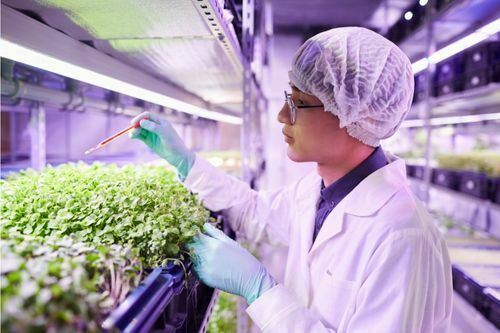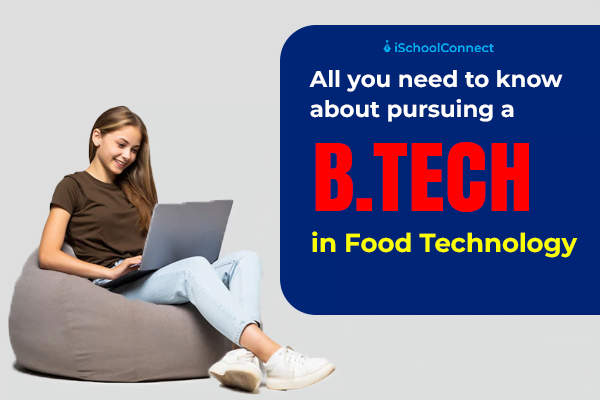Table of Contents
- Overview of the BTech in Food Technology
- Eligibility criteria BTech in Food Technology
- What is the difference between a BTech in Food Technology and a B.Sc. in Food Technology?
- What abilities do you need to be a graduate in BTech in Food Technology?
- Why should you pursue BTech in Food Technology?
- What does a Food Technologist do?
- Key takeaways
- FAQs
BTech in Food Technology is a four-year degree program that combines the study of food science and food engineering. Food technology studies numerous elements of food, such as chemical composition, food life, preservation, packaging technology, storage conditions, food chemistry, nutritional value, and microbiological development.
Overview of the BTech in Food Technology
The BTech in Food Technology degree program also offers marketing training in the food business. A student is ready to recognize the benefits of a food product and use them as a marketing factor.
Food technology is concerned with the production of packaging materials, storage containers, preservatives, colorants, flavors, long-term storage food, and other products that meet the standards set by government organizations on national and worldwide platforms.
Eligibility criteria BTech in Food Technology

The following basic qualification requirements must be met in order to apply for BTech in Food Technology
- The candidate must have received at least a 10+2 grade from a recognized board.
- They had to have taken the regular, required math, physics, and chemistry courses.
- They had to obtain at least 60% in their academics. For candidates in the reserved category it is 45% and above.
What is the difference between a BTech in Food Technology and a B.Sc. in Food Technology?
B.Sc Food Technology is a three-year degree program, whereas B.Tech Food Technology is a four-year program. B.Sc in Food Technology offers additional academic ideas and the fundamentals of various food processes. B.Tech in Food Technology, on the other hand, focuses on the practical aspects of the food sector and its technologies.
Compared to a B.Sc. in Food Technology, the curriculum of a B.Tech study covers a significantly broader range of technologies and machinery used in the food business. The prospects available to students after completing the in Food Technology course is far greater than that of B.Sc. in Food Technology.
What abilities do you need to be a graduate in BTech in Food Technology?
- A student should understand physics, chemistry, math, and biology.
- A student should understand the concepts of biomolecules, biotechnology, and genetic engineering learned in biology class.
- A student should be curious about the composition of nutrients found in food and the processes that food goes through.
- A student should be interested in learning about various food processing machines’ design, operation, and production.
Why should you pursue BTech in Food Technology?
The BTech in Food Technology program covers both food science and food engineering. The study of food technology includes topics such as food chemistry, food life, preservation, packaging, storage conditions, nutritional value, microbial growth, and others.
The goal of food science is to develop novel products or technologies, increase the shelf life of food products, and discover new nutrients and health benefits for ingredients. A food technologist is involved in the design of the food plant and various processing tools in addition to the processing of the food itself.
What does a Food Technologist do?

- Examine the nutritional status and the number of substances in food goods, such as preservatives, colorants, and essence.
- Food product development and production
- Research and development
- Supervision of food material manufacture and processing
- Checking for microbiological contamination in food goods
Key takeaways
- The food technology business is rapidly expanding, accounting for around 14% of manufacturing GDP and 13% of total food exports in India.
- BTech Food Technology is a four-year undergraduate program broken into eight semesters.
- To apply for this BTech Course, you must have completed 10+2 with at least 60% aggregate in physics and mathematics and one optional from chemistry/biology/biotechnology from a recognized university.
Liked this blog? Read next: Food Science | What does pursuing this course entail?
FAQs
Q1. What are the job opportunities open to BTech Food Technology students?
Answer: Graduates will work as Food Technologists, Food Production Managers, Food Safety officers, Sensory Evaluators, Technical Brewer, and Quality Control managers with a BTech Food Tech degree.
Q2. What is the typical income for a BTech Food Technology candidate?
Answer:The average salary for a Food Technologist is $55748 per year in the United States and in India it ranges from INR 4.25 Lakhs to INR 10 Lakhs.
Q3. What are the post-secondary opportunities for BTech Food Tech graduates?
Answer: MTech Food Technology, MSc Food Technology, Postgraduate Diploma in Food Production, and MBA are all options after BTech in Food Technology.






